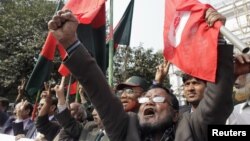Bangladesh's war tribunal has sentenced an Islamic cleric to death for what court calls crimes against humanity for his actions during the country's 1971 war for independence from Pakistan.
Abul Kalam Azad, tried in absentia because he has been on the run for about a year, is the first person to be convicted by the controversial tribunal created by the country's government to try suspected war criminals.
Three million people were killed and hundreds of thousands of women were raped during the nine-month war. Authorities say the Islamist leaders collaborated with the Pakistani army in committing atrocities during the conflict.
The Jamaat-e-Islami party is demanding authorities halt the trials of its top leaders on war crimes charges. The party and its ally, the main opposition Bangladesh Nationalist Party, have said the ruling Awami League party set up the special war crimes tribunal to target political opponents.
New York-based Human Rights Watch has said legal procedures used by the tribunal fall short of international standards.
Abul Kalam Azad, tried in absentia because he has been on the run for about a year, is the first person to be convicted by the controversial tribunal created by the country's government to try suspected war criminals.
Three million people were killed and hundreds of thousands of women were raped during the nine-month war. Authorities say the Islamist leaders collaborated with the Pakistani army in committing atrocities during the conflict.
The Jamaat-e-Islami party is demanding authorities halt the trials of its top leaders on war crimes charges. The party and its ally, the main opposition Bangladesh Nationalist Party, have said the ruling Awami League party set up the special war crimes tribunal to target political opponents.
New York-based Human Rights Watch has said legal procedures used by the tribunal fall short of international standards.





